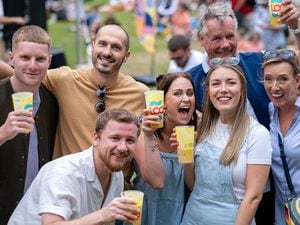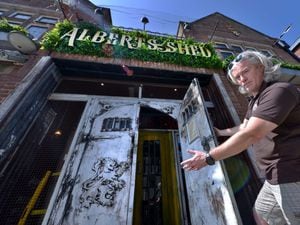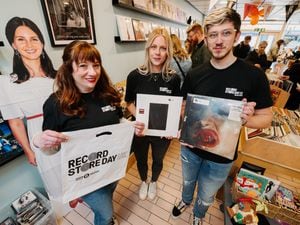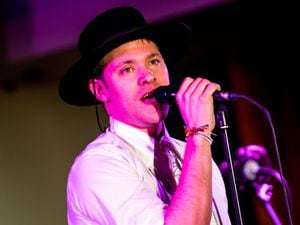Radio 1 still rocking after 50 years
For a brash young DJ, who had left the world of pirate broadcasting to make his mark at the BBC in the late 1960s, it must have been a strange sight indeed.
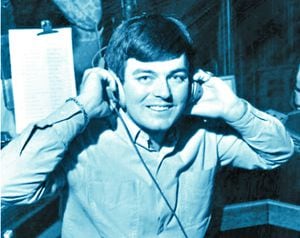
“It was the flower-power era," recalls Tony Blackburn.
""When I got to Broadcasting House a lot of the producers were wearing floral shirts to try to fit in with us.
“That was strange because we from the pirate ships were in suits."
It is 50 years today since the launch of BBC Radio 1, and what was then its close sister station Radio 2. Blackburn – along with the sound-effect of a barking dog, was the first voice to be heard on the new station, as he cheerily introduced Flowers in the Rain by Birmingham band The Move. The shake-up, which saw the old BBC Light Programme replaced by the two new stations, would change the nature of broadcasting forever. It would also turn a young man from Tong, near Albrighton, called Simon Bates, into a household name. At the height of his fame, 11 million people would tune in every day to Bates' mid-morning show, best-known for its "Our Tune" slot where a listener's story was read out on air, along with a record that was dear to them.
Bates, who was back in his home village this week for a birthday party, says the success of Radio 1 was down to the way it nurtured creative talent.
"The station has produced some great broadcasters as a result of incredibly progressive management and proactive production teams, who positively demanded creativity," he says.
"Take Nicky Campbell, Jonathan Ruffle Steve Wright, Tommy Vance, Fergus Dudley, Clare Sturgess and Mike Woolmans, who's currently composing a musical with Steppenwolf in Chicago."
"Their success in turn is down to the vision of the likes of Johnny Beerling and Roger Lewis. Great chance takers all."
Beerling, who had worked as a producer on the BBC Light Programme, was one of the few senior figures at the BBC who had seen the potential in adopting some of the maverick style of the offshore stations, which were the bane of the corporation for much of the 1960s.
When the Government announced the Maritime Broadcasting Act, which would effectively ban the pirate stations, the deal was that the BBC would replace the Light Programme with two stations that would focus on pop music. It fell to Beerling to recruit the DJs for Radio 1, and he turned to many of the former pirate DJs such as Blackburn.
It was not always an easy relationship in the early days, recalls "Diddy" David Hamilton, then a fresh-faced 31-year-old who joined a few weeks after the launch of the fledgling station.
"At that time the BBC was a very conservative with a small 'c' organisation," he says. "Some of the presenters had long hair and wore beads, I think it was a bit of a culture shock."
For some of the ex pirates, the transition to the more sedate environment of the BBC was also difficult.
Kenny Everett, who had turned down a job on the old Light Programme to work on the pirate ships, was one of the first to fall foul. At his audition, one member of the panel said that some of his act was in bad taste, "but with suitable restraint and encouragement, Kenny Everett could be one of the BBC's best DJs." In 1970 Everett was sacked for joking that Mary Peyton, the wife of transport minister John Peyton, had bribed a driving test examiner. He returned to the station three years later, but this time doing pre-recorded shows which could be vetted beforehand.
Yet Hamilton says it was the opportunity for the presenters to "ad-lib" that gave the new station its vibrancy.
"Up until then, everything on the BBC had been scripted," he says.
"Somebody would pick the records that would be played, somebody else would write the script, and then that would have to be shown to somebody for approval. But now the DJs could actually engage with the listener and ad-lib a bit."
Although Radio 1 and 2 were separate stations, in the early days much of the programming was shared, with many shows carried forward from the old Light Programme. It was former Shrewsbury schoolboy Douglas Muggeridge, who took over as controller in 1969, who began to give the two stations separate identities, introducing the twice-daily Newsbeat news programme to Radio 1, and tying down DJs such as Hamilton, Blackburn, Pete Murray and Jimmy Young to long-term contracts.
Another former pupil of Shrewsbury School, John Peel, would become something of a legend for his championing of new, grassroots music.
Hamilton, who has just written a book about his time on the station, recalls a time of mirth and mayhem, and antics that would not be allowed today.
"The DJs always used to be trying to play tricks on one another, trying to make them laugh so that they would 'corpse' on air," he says.
"Somebody would set fire to somebody else's script, somebody threw a bucket of water at somebody, somebody put a pair of pyjamas over somebody's head.
"One of the funniest things was when we had Britain's first nude DJ, a man called David Symonds.
"He was leaving the BBC anyway, so he didn't care, and one day he was presenting his show wearing only his headphones.
"There were a bunch of Japanese businessmen tourists who were touring the building, and there was this BBC executive showing them around.
"Being Japanese tourists, they all had cameras around their necks, and they were asking 'is this a naturist DJ?', and 'do the women do that as well?', and this BBC executive just said 'no it is nothing', and tried to usher them out of the door.
"I was in the next studio and could see all this through the window, it was really funny."
He also recalls Alan Freeman presenting a show called "Get It Off Your Chest", where listeners were invited to discuss the big issues of the day. However, some of the show's female fans took the title a bit too literally, and the Freeman would broadcast the show surrounded by bras.
"You couldn't imagine something like that today."
Despite the risque antics, Hamilton says the thing about Radio 1 in those early days was that is was all about family entertainment.
"At that time, it was all there really was to listen to, it was not like today where you have commercial stations and then every city has several local stations.
"Also 50 years ago, the pop charts appealed to all the family, from the grandparents to the children, they would all sit and listen to Radio 1 together."
Will Radio 1 still be around to celebrate its 100th anniversary, 50 years from now?
It seems opinions are divided. Hamilton thinks it will, believing young people will always want to listen to music without the interruption of adverts.
"I think young people are just as interested in pop music now as they were 50 years ago, it's just a different type of music."
Bates is less convinced. He believes there is a place for such a station, but that will mean harnessing the pioneering spirit demonstrated by the likes of Johnny Beerling and his boss Robert Scott.
He warns: "If we're not careful and we don't nurture and value the BBC for what it really is, annoyingly wonderful, there won't be a Radio One in 50 years."
*The Golden Days Of Radio 1: Hotshots, Big Shots And Potshots is on sale now.

